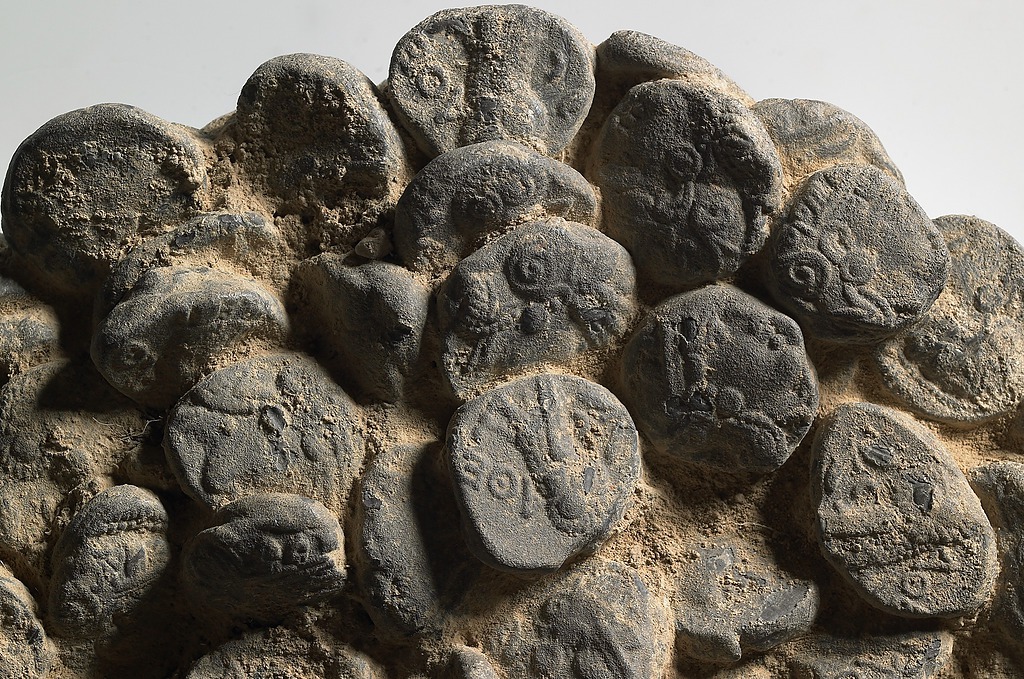22

More Middle Voice
–μι Verbs
Recall that among –μι verbs, there is a group of four particularly common verbs:
- δίδωμι give (verb stem: δω-/δο-)
- τίθημι put, make (verb stem: θη-/θε-)
- ἵστημι stand (verb stem: στη-/στα-)
- ἵημι throw (verb stem: ἡ-/ἑ-)
Observe that the inflection of these verbs in the present middle share the following characteristics:
- In the MIDDLE VOICE, these verbs end their stems in a SHORT VOWEL in both singular and plural. (In the ACTIVE VOICE, these verbs end their present tense stems in a LONG VOWEL in the singular and a SHORT VOWEL in the plural forms. )
- To this stem is added the ATHEMATIC MIDDLE VOICE personal endings.
- The INTERVOCALIC SIGMA found in the 2nd person singular does NOT drop (S 744).
The Present, Indicative, Middle of δίδωμι (S 416; GPH p. 123)
|
δίδομαι |
διδόμεθα |
|
δίδοσαι |
δίδοσθε |
|
δίδοται |
δίδονται |
Present Indicative Middle Infinitive: δίδοσθαι
The Present, Indicative, Middle of τίθημι (S 416; GPH p. 145)
|
τίθεμαι |
τιθέμεθα |
|
τίθεσαι |
τίθεσθε |
|
τίθεται |
τίθενται |
Present Indicative Middle Infinitive: τίθεσθαι
The Present, Indicative, Middle of ἵστημι (S 416; GPH p. 134)
|
ἵσταμαι |
ἱστάμεθα |
|
ἵστασαι |
ἵστασθε |
|
ἵσταται |
ἵστανται |
Present Indicative Middle Infinitive: ἵστασθαι
The Present, Indicative, Middle of ἵημι (S 777)
|
ἵεμαι |
ἱέμεθα |
|
ἵεσαι |
ἵεσθε |
|
ἵεται |
ἵενται |
Present Indicative Middle Infinitive: ἵεσθαι
Middle Future Verbs
Some verbs that are regularly ACTIVE in the PRESENT TENSE are regularly MIDDLE in the FUTURE TENSE. The challenge of conveying middle meaning in the future of these verbs is complex, and a topic reserved for advanced study. A few tendencies, however, may be noted (S 805-806):
- They often form their present tense stem with –αν– or –σκ-.
- They often denote the activities of the physical organs or senses (voice, sight, hearing, smell, touch…)
Note the following verbs from previous vocabulary that have MIDDLE (but no ACTIVE) FUTURES.
- ἀκούω, ἀκούσομαι hear
- ἁμαρτάνω, ἁμαρτήσομαι (ἁμαρτ-) miss, make a mistake
- ἀποθνῄσκω, ἀποθανοῦμαι (θαν-) die
- βαίνω, βήσομαι (βη-) walk, come, go
- βλέπω, βλέψομαι see, look (at)
- γιγνώσκω, γνώσομαι (γνω-) know, learn, judge, think
- εἰμί, ἔσομαι (ἐσ-) be
- λαμβάνω, λήψομαι (λαβ-/ληβ-) take, grab; receive, get
- μανθάνω, μαθήσομαι (μαθ-) learn, ascertain
- πίνω, πίομαι (πι-) drink
- φεύγω, φεύξομαι flee, run away, avoid, shun
Putting it all together, the Future, Indicative, Middle of λαμβάνω take (verb stem: λαβ-/ληβ-) would appear as follows:
|
λήψομαι |
ληψόμεθα |
|
λήψει/ῃ |
λήψεσθε |
|
λήψεται |
λήψονται |
Future Indicative Middle Infinitive: λήψεσθαι
Another important verb, εἰμί to be, forms its future in the middle voice. Recall that the verb stem for εἰμί is ἐσ-. To this stem is added a thematic vowel and the middle personal endings. The result is a Future Indicative that inflects as follows (S 768; GPH p. 181):
|
ἔσομαι |
ἐσόμεθα |
|
ἔσει/ῃ |
ἔσεσθε |
|
ἔσεται or ἔσται |
ἔσονται |
Future Indicative Middle Infinitive: ἔσεσθαι
Unorthodox Futures
The following verbs all have futures, mostly in the middle voice, with variations or stem changes that are unpredictable or more complex than the patterns presented so far. These are all common and important verbs, however, and recognizing these unusual forms is essential to reading Greek.
- ἔρχομαι, ἐλεύσομαι come, go
- ἐσθίω, φάγομαι eat
- ἔχω, ἕξω or σχήσω have, hold, be
- παρέχω, παρέξω provide
- ὁράω, ὄψομαι see
- πάσχω, πείσομαι suffer, experience
- πίπτω, πεσοῦμαι fall
- πλέω, πλεύσομαι and πλευσοῦμαι sail
- πυνθάνομαι, πεύσομαι learn, hear, inquire
- τίκτω, τέξομαι give birth
- τυγχάνω, τεύξομαι happen, meet
- φέρω, οἴσω carry, bear, endure
- διαφέρω, διοίσω spread, differ
- συμφέρω, συνοίσω benefit, profit
– τὸ τέλος –
Paradigms, Key Terms and Concepts
- Chapter Paradigms
- MIDDLE VOICE OF δίδωμι, τίθημι, ἵστημι, ἵημι
- MIDDLE FUTURE VERBS
- UNORTHODOX FUTURES
Vocabulary List 1
Middle Futures:
- ἀκούω, ἀκούσομαι hear
- ἁμαρτάνω, ἁμαρτήσομαι (ἁμαρτ-) miss, make a mistake
- ἀποθνῄσκω, ἀποθανοῦμαι (θαν-) die
- βαίνω, βήσομαι (βη-) walk, come, go
- βλέπω, βλέψομαι see, look (at)
- γιγνώσκω, γνώσομαι (γνω-) know, learn, judge, think
- εἰμί, ἔσομαι (ἐσ-) be
- λαμβάνω, λήψομαι (λαβ-/ληβ-) take, grab; receive, get
- μανθάνω, μαθήσομαι (μαθ-) learn, ascertain
- πίνω, πίομαι (πι-) drink
- φεύγω, φεύξομαι flee, run away, avoid, shun
Vocabulary List 2
Unorthodox Futures:
- ἔρχομαι, ἐλεύσομαι come, go
- ἐσθίω, φάγομαι eat
- ἔχω, ἕξω or σχήσω have, hold, be
- παρέχω, παρέξω provide
- ὁράω, ὄψομαι see
- πάσχω, πείσομαι suffer, experience
- πίπτω, πεσοῦμαι fall
- πλέω, πλεύσομαι and πλευσοῦμαι sail
- πυνθάνομαι, πεύσομαι learn, hear, inquire
- τίκτω, τέξομαι give birth
- τυγχάνω, τεύξομαι happen, meet
- φέρω, οἴσω carry, bear, endure
- διαφέρω, διοίσω spread, differ
- συμφέρω, συνοίσω benefit, profit
Exercises
I. Memorize the vocabulary.
II. Translate into the appropriate inflected Greek verb the following:
- he will be
- you will experience
- we will carry/bear
- you all will walk
- they will know
- you (sg.) will learn
- it will differ
- we will give
- they will hear
- you all will eat
Reading Passages
Κατὰ Μαθθαῖον 9.14-17; Κατὰ Μᾶρκον 2.18-22: AGE Ch. 22a.
Aristotle Generation of Animals 724a20-35: AGE Ch. 22b.
